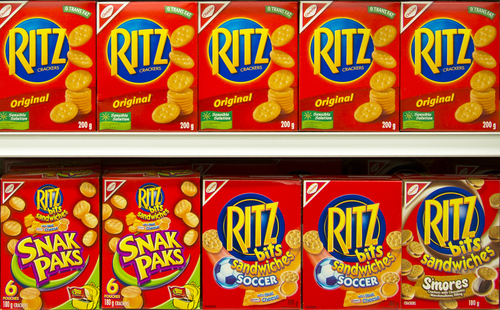Are Ritz Crackers Bad For You?
Short answer
Ritz crackers are bad for you. They've got marginal levels of nutrients and a lot of questionable additives that your body doesn't need.
Recommended Alternative
Category 'F' is for things that fail to bring anything beneficial to the table, and are very harmful to your health. We recommend completely avoiding anything in this category. Long-term side effects of 'F' items are usually very serious.
View Full Grading System
Category 'A'
Very healthy and numerous health benefits. Side effects are rare. Things rated an 'A+' are typically necessary for survival (for example, water).
Very healthy and numerous health benefits. A few harmful qualities may be associated, but only under certain circumstances such as an allergic reaction.
Very healthy and numerous health benefits. Harmful qualities may be associated, but aren't usually serious.
It is important to note that even the best things in life can become bad in immoderate amounts. So, although something may be rated an 'A+', overconsumption/overdoing can bring unwanted effects.
Category 'B'
Very beneficial to your health. Things rated a 'B+' may have a few harmful qualities to pay attention to.
Overall beneficial to your health. Things rated a 'B' may have some harmful qualities to pay attention to.
More beneficial to your health than not. However, harmful qualities are most likely associated and shouldn't be overlooked.
The main difference between category 'A' and category 'B' is the harmful qualities typically present in 'B' items. Serious side effects are usually uncommon, but are still possible and should be taken note of.
Category 'C'
Both beneficial and harmful qualities associated. Things rated a 'C+' are typically a bit more on the beneficial side. Still, moderation is important.
A fairly even ratio of beneficial and harmful qualities. Moderation is important. Very general topics that can lean towards both sides of the spectrum will be placed here as well. Rice, for example, can be good or bad depending on the type.
More harmful than beneficial. Side effects are common, especially when consumed/done excessively. Moderation is very important.
Category 'C' usually denotes to both good and bad qualities. When it comes to this category, it is important to keep this word in mind: moderation.
Category 'D'
Harmful to your health. Although benefits may be associated, the bad most likely outweighs the good. Moderation is very important.
Harmful to your health. A few benefits may be associated, but the bad outweighs the good. Moderation is extremely important.
Harmful to your health. Very few, if any, benefits are present. Things in this category should be avoided as much as possible.
Category 'D' is typically for things that are more harmful than beneficial. While consuming/doing something unhealthy once in a blue moon shouldn't hurt, we definitely recommend eliminating 'D' items as a regular part of your routine/diet.
Category 'F'
Category 'F' is for things that fail to bring anything beneficial to the table, and are very harmful to your health. We recommend completely avoiding anything in this category. Long-term side effects of 'F' items are usually very serious.
Category 'N'
'N' stands for neutral. Things placed into this category are generally (a) neither good nor bad for you, or (b) lack the necessary evidence to reach any conclusions.
Long answer
Some varieties of Ritz crackers are rich in sodium - a single serving of Ritz Bitz Cheese has almost 500 grams, which is between one-half and one-third of the sodium that you need for the day. Eat two or three servings, and you'll quickly rise above a thousand grams of sodium. That's way too much for two packs of crackers. Even if the other meals that day have no sodium whatsoever - unlikely at best - you're already at the limit for the elderly or those with cardiovascular problems. Combine a single serving of Ritz crackers with, say, a single serving of ramen, and you're near the max limit for someone in perfectly good health. That's way more sodium than you need.
Ritz crackers contain high fructose corn syrup. HFCS isn't pure fructose - it's got glucose in it as well. Still, it rocks a 65% fructose level, despite the fact that crackers are not a fruit. Fructose is digested in the liver; it's broken down into sugars and stored as fat; may of those globules land in your circulatory system. Eat too much HFCS over time, and that stored fat can clog up your arteries and bring on chronic conditions like high blood pressure, hypertension, and heart disease. They're dangerous in combination with sodium, which has a similar effect.
This wouldn't be so bad if there was some fiber in Ritz crackers to slow the rate at which HFCS was absorbed and broken down by the body. Because Ritz are made with refined flour, they've got no fiber. That means the uglier ingredients hit your body's systems quickly and unmitigated.
Most varieties of Ritz crackers also have the ominous catch-all "natural flavors," which is discussed elsewhere on this site. Natural flavor could be pretty much anything; provided that it's extracted rather than synthesized, all kinds of flavoring agents can be called "natural flavor." Usually, several are combined in a lab to nail down a particular taste. That doesn't mean that they're bad for you, but it says very little about what they are - be cautious where you see "natural flavor" on a label.
Possible long-term side effects
- hypertension
-
heart disease
-
bodily inflammation
-
weight gain, obesity
-
diabetes
-
cancer
Ingredients to be aware of
Our Wellness Pick
(what is this?)
Back to Nature Crackers
- Gluten-free snack
- Non-GMO ingredients
- Multi-seed variety
- Convenient 4oz packs
Learn More!
Please turn your Ad Blocker off to see this content. Thank you!

 Approved by
Approved by 















